Answered step by step
Verified Expert Solution
Question
1 Approved Answer
Coda Coffee and bext360 Supply Chain: Machine Vision, AI, IoT, and Blockchain We've developed amazing relationships with many of our coffee farmers, and it
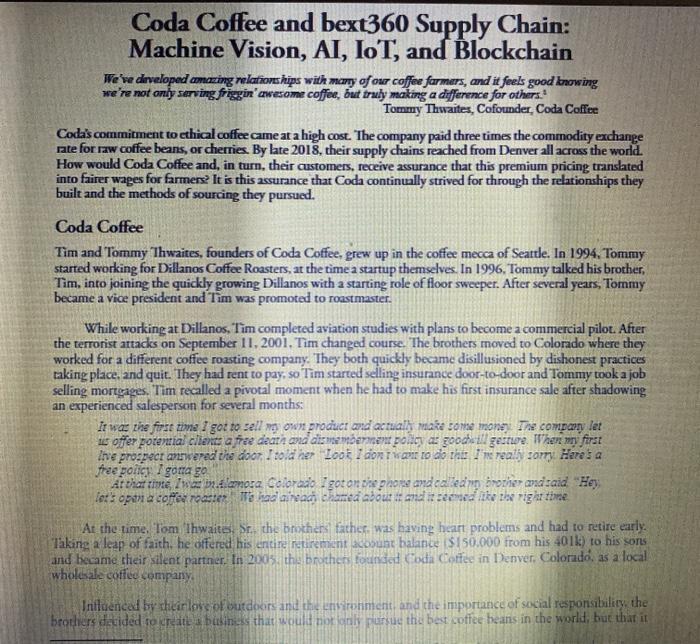
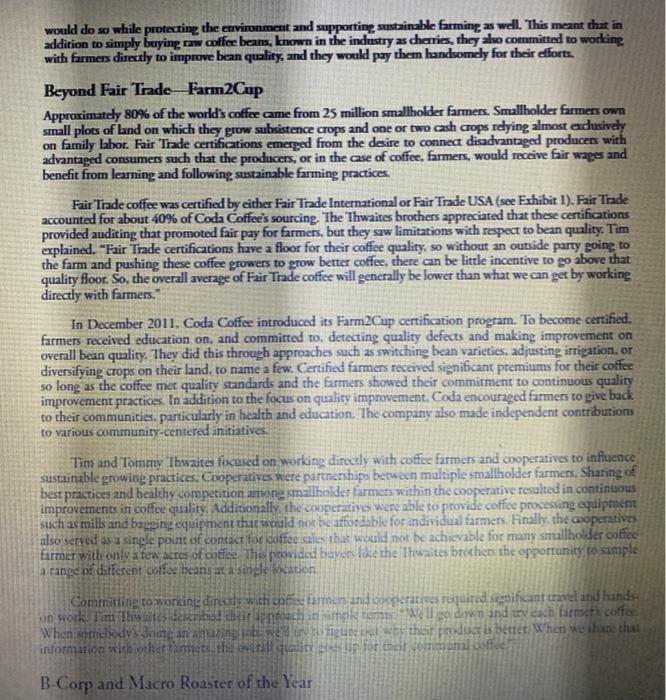
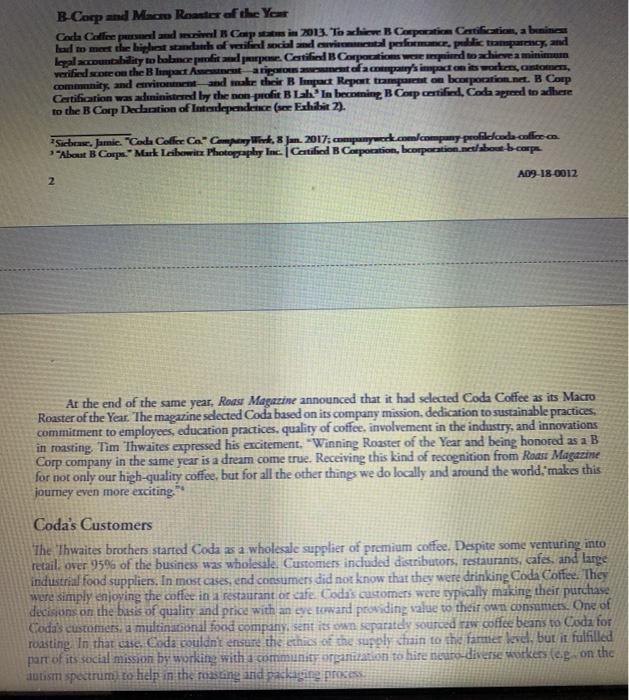
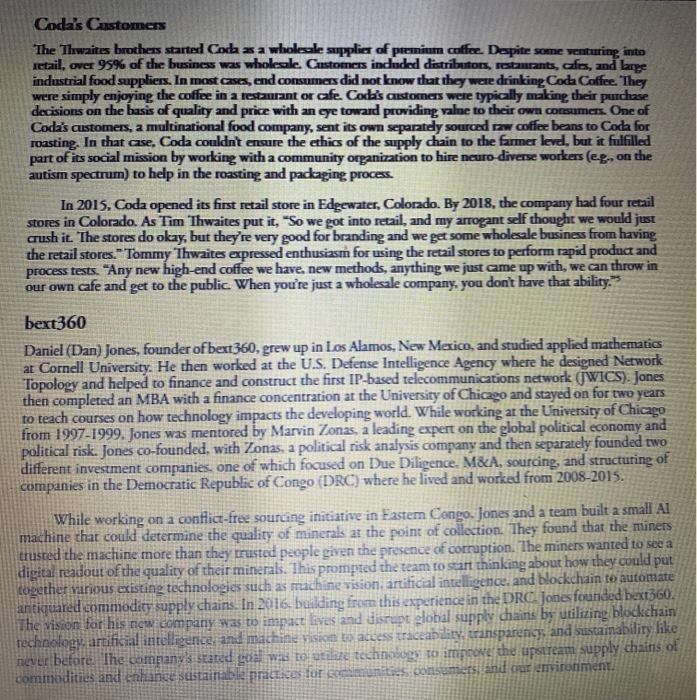
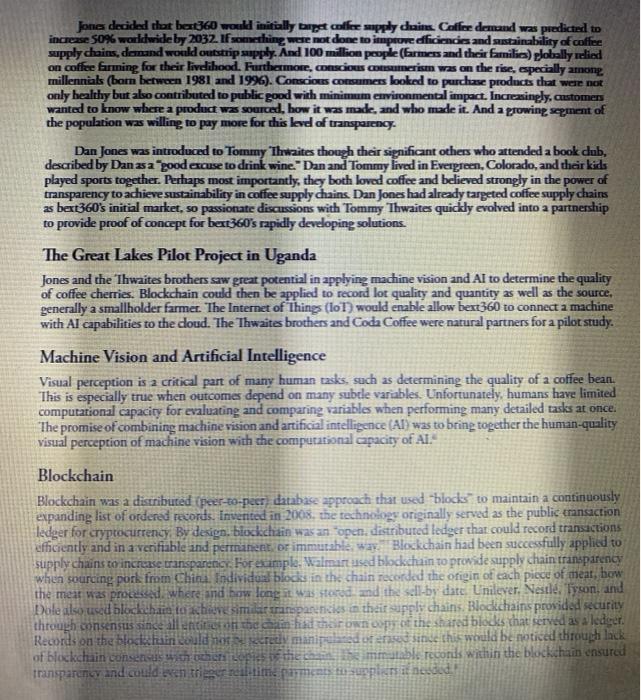
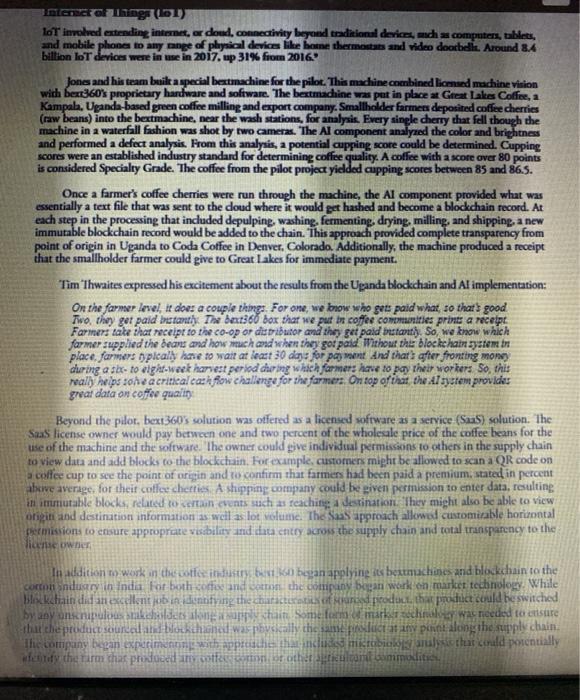
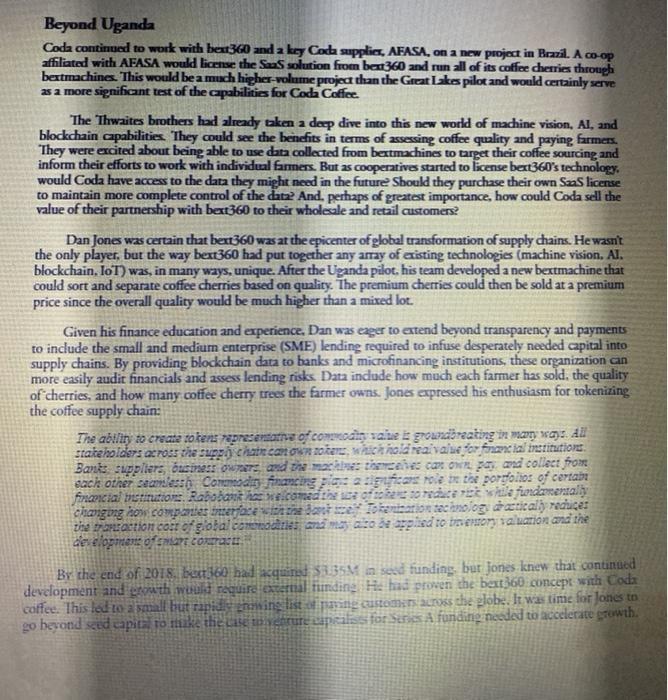

Coda Coffee and bext360 Supply Chain: Machine Vision, AI, IoT, and Blockchain We've developed amazing relationships with many of our coffee farmers, and it feels good knowing we're not only serving friggin' awesome coffee, but truly making a difference for others." Tommy Thwaites, Cofounder, Coda Coffee Coda's commitment to ethical coffee came at a high cost. The company paid three times the commodity exchange rate for raw coffee beans, or cherries. By late 2018, their supply chains reached from Denver all across the world. How would Coda Coffee and, in turn, their customers, receive assurance that this premium pricing translated into fairer wages for farmers? It is this assurance that Coda continually strived for through the relationships they built and the methods of sourcing they pursued. Coda Coffee Tim and Tommy Thwaites, founders of Coda Coffee, grew up in the coffee mecca of Seattle. In 1994, Tommy started working for Dillanos Coffee Roasters, at the time a startup themselves. In 1996, Tommy talked his brother, Tim, into joining the quickly growing Dillanos with a starting role of floor sweeper. After several years, Tommy became a vice president and Tim was promoted to roastmaster. While working at Dillanos, Tim completed aviation studies with plans to become a commercial pilot. After the terrorist attacks on September 11, 2001. Tim changed course. The brothers moved to Colorado where they worked for a different coffee roasting company. They both quickly became disillusioned by dishonest practices taking place, and quit. They had rent to pay, so Tim started selling insurance door-to-door and Tommy took a job selling mortgages. Tim recalled a pivotal moment when he had to make his first insurance sale after shadowing an experienced salesperson for several months: It was the first time I got to sell my own product and actually make some money. The company let us offer potential clients a free death and dismemberment policy as goodwill gesture. When my first Ive prospect answered the door, I told her "Look I dont want to do this I'm really sorry. Here's a free policy I gotta go At that time, I was Alamosa Colorado I got on the phone and called my brother and said "Hey let's open a coffee roaster We had already chatted about it and it seemed the the right time At the time. Tom Thwaites. Sr., the brothers father, was having heart problems and had to retire early. Taking a leap of faith, he offered his entire retirement account balance ($150.000 from his 401k) to his sons and became their silent partner. In 2005, the brothers founded Coda Coffee in Denver, Colorado, as a local wholesale coffee company. Influenced by their love of outdoors and the environment, and the importance of social responsibility, the brothers decided to create a business that would not only pursue the best coffee beans in the world, but that it would do so while protecting the environment and supporting sustainable farming as well. This meant that in addition to simply buying raw coffee beans, known in the industry as cherries, they also committed to working with farmers directly to improve bean quality, and they would pay them handsomely for their efforts. Beyond Fair Trade Farm2Cup Approximately 80% of the world's coffee came from 25 million smallholder farmers. Smallholder farmers own small plots of land on which they grow subsistence crops and one or two cash crops relying almost exclusively on family labor. Fair Trade certifications emerged from the desire to connect disadvantaged producers with advantaged consumers such that the producers, or in the case of coffee, farmers, would receive fair wages and benefit from learning and following sustainable farming practices. Fair Trade coffee was certified by either Fair Trade International or Fair Trade USA (see Exhibit 1). Fair Trade accounted for about 40% of Coda Coffee's sourcing. The Thwaites brothers appreciated that these certifications provided auditing that promoted fair pay for farmers, but they saw limitations with respect to bean quality. Tim explained. "Fair Trade certifications have a floor for their coffee quality, so without an outside party going to the farm and pushing these coffee growers to grow better coffee, there can be little incentive to go above that quality floor. So, the overall average of Fair Trade coffee will generally be lower than what we can get by working directly with farmers." In December 2011. Coda Coffee introduced its Farm2Cup certification program. To become certified. farmers received education on, and committed to, detecting quality defects and making improvement on overall bean quality. They did this through approaches such as switching bean varieties, adjusting irrigation, or diversifying crops on their land, to name a few. Certified farmers received significant premiums for their coffee so long as the coffee met quality standards and the farmers showed their commitment to continuous quality improvement practices. In addition to the focus on quality improvement. Coda encouraged farmers to give back to their communities, particularly in health and education. The company also made independent contributions to various community-centered initiatives. Tim and Tommy Thwaites focused on working directly with coffee farmers and cooperatives to influence sustainable growing practices, Cooperatives were partnerships between multiple smallholder farmers. Sharing of best practices and healthy competition among smallholder farmers within the cooperative resulted in continuous improvements in coffee quality. Additionally, the cooperatives were able to provide coffee processing equipment such as mills and bagging equipment that would not be affordable for individual farmers. Finally, the cooperatives also served as a single point of contact for coffee sales that would not be achievable for many smallholder coffee farmer with only a few acres of coffee. This provided bayers like the Thwaites brothers the opportunity to sample a range of different coffee beans at a single location. Committing to working directly with coffee farmers and cooperatives required significant travel and hands on work. Tim Thwaites described their approach in simple tems Well go down and try each farmer's coffee When somebody's doing an amazing i weld to figure out why the product is better. When we shane that information with other farmers, the install quality goes up for their communal coffee B-Corp and Macro Roaster of the Year 2 B-Corp and Macro Roaster of the Year Coda Coffee pursued and received B Comp status in 2013. To achieve B Corporation Certification, a beniness had to meet the highest standards of verified social and environmental performance, public transparency, and legal accountability to balance profit and purpose. Certified B Corporations were repaired to achieve a minimu verified score on the B Impact Assessment a rigorous assessment of a company's impact on its workers, cantomers, community, and environment and make their B Impact Report tramparent on boorporation.net. B Corp Certification was administered by the non-profit B Lah' In becoming B Corp certified, Coda agreed to adhere to the B Corp Declaration of Interdependence (see Exhibit 2). Siebrase, Jamie. "Coda Coffee Co." Company Werk, 8 Jan. 2017; companyweek.com/company profile/cuda-coffee-co "About B Corps." Mark Leibowitz Photography Inc. Certified B Corporation, bcorporation.net/about-b-corps. A09-18-0012 At the end of the same year, Roast Magazine announced that it had selected Coda Coffee as its Macro Roaster of the Year. The magazine selected Coda based on its company mission, dedication to sustainable practices. commitment to employees, education practices, quality of coffee, involvement in the industry, and innovations in roasting, Tim Thwaites expressed his excitement. "Winning Roaster of the Year and being honored as a B Corp company in the same year is a dream come true. Receiving this kind of recognition from Roast Magazine for not only our high-quality coffee, but for all the other things we do locally and around the world, makes this journey even more exciting." Coda's Customers The Thwaites brothers started Coda as a wholesale supplier of premium coffee. Despite some venturing into retail, over 95% of the business was wholesale. Customers included distributors, restaurants, cafes, and large industrial food suppliers. In most cases, end consumers did not know that they were drinking Coda Coffee. They were simply enjoying the coffee in a restaurant or cafe. Coda's customers were typically making their purchase decisions on the basis of quality and price with an eye toward providing value to their own consumers. One of Coda's customers, a multinational food company, sent its own separately sourced raw coffee beans to Coda for roasting. In that case. Coda couldn't ensure the ethics of the supply chain to the farmer level, but it fulfilled part of its social mission by working with a community organization to hire neuro-diverse workers (eg on the autism spectrum) to help in the roasting and packaging process. Coda's Customers The Thwaites brothers started Coda as a wholesale supplier of premium coffee. Despite some venturing into retail, over 95% of the business was wholesale. Customers included distributors, restaurants, cafes, and large industrial food suppliers. In most cases, end consumers did not know that they were drinking Coda Coffee. They were simply enjoying the coffee in a restaurant or cafe. Coda's customers were typically making their purchase decisions on the basis of quality and price with an eye toward providing value to their own consumers. One of Coda's customers, a multinational food company, sent its own separately sourced raw coffee beans to Coda for roasting. In that case, Coda couldn't ensure the ethics of the supply chain to the farmer level, but it fulfilled part of its social mission by working with a community organization to hire neuro-diverse workers (eg, on the autism spectrum) to help in the roasting and packaging process. In 2015, Coda opened its first retail store in Edgewater, Colorado. By 2018, the company had four retail stores in Colorado. As Tim Thwaites put it, "So we got into retail, and my arrogant self thought we would just crush it. The stores do okay, but they're very good for branding and we get some wholesale business from having the retail stores." Tommy Thwaites expressed enthusiasm for using the retail stores to perform rapid product and process tests. "Any new high-end coffee we have, new methods, anything we just came up with, we can throw in our own cafe and get to the public. When you're just a wholesale company, you don't have that ability." bext360 Daniel (Dan) Jones, founder of bext 360, grew up in Los Alamos, New Mexico, and studied applied mathematics at Cornell University. He then worked at the U.S. Defense Intelligence Agency where he designed Network Topology and helped to finance and construct the first IP-based telecommunications network (JWICS). Jones then completed an MBA with a finance concentration at the University of Chicago and stayed on for two years to teach courses on how technology impacts the developing world. While working at the University of Chicago from 1997-1999. Jones was mentored by Marvin Zonas, a leading expert on the global political economy and political risk. Jones co-founded, with Zonas, a political risk analysis company and then separately founded two different investment companies, one of which focused on Due Diligence. M&A, sourcing, and structuring of companies in the Democratic Republic of Congo (DRC) where he lived and worked from 2008-2015. While working on a conflict-free sourcing initiative in Eastern Congo. Jones and a team built a small Al machine that could determine the quality of minerals at the point of collection. They found that the miners trusted the machine more than they trusted people given the presence of corruption. The miners wanted to see a digital readout of the quality of their minerals. This prompted the team to start thinking about how they could put together various existing technologies such as machine vision, artificial intelligence, and blockchain to automate antiquated commodity supply chains. In 2016, building from this experience in the DRC Jones founded bext360. The vision for his new company was to impact lives and disrupt global supply chains by utilizing blockchain technology artificial intelligence, and machine vision to access traceability, transparency, and sustamability like never before. The company's stated goal was to utilize technology to improve the upstream supply chains of commodities and enhance sustainable practices for communities, consumers, and our environment. Jones decided that bext360 would initially target coffee supply chains. Coffee demand was predicted to increase 50% worldwide by 2032. If something were not done to improve efficiencies and sustainability of coffee supply chains, demand would outstrip supply. And 100 million people (farmers and their families) globally relied on coffee farming for their livelihood. Furthermore, conscious consumerism was on the rise, especially among millennials (born between 1981 and 1996). Conscious consumers looked to purchase products that were not only healthy but also contributed to public good with minimum environmental impact. Increasingly, customers wanted to know where a product was sourced, how it was made, and who made it. And a growing segment of the population was willing to pay more for this level of transparency. Dan Jones was introduced to Tommy Thwaites though their significant others who attended a book club, described by Dan as a "good excuse to drink wine." Dan and Tommy lived in Evergreen, Colorado, and their kids played sports together. Perhaps most importantly, they both loved coffee and believed strongly in the power of transparency to achieve sustainability in coffee supply chains. Dan Jones had already targeted coffee supply chains as bext360's initial market, so passionate discussions with Tommy Thwaites quickly evolved into a partnership to provide proof of concept for bext360's rapidly developing solutions. The Great Lakes Pilot Project in Uganda Jones and the Thwaites brothers saw great potential in applying machine vision and AI to determine the quality of coffee cherries. Blockchain could then be applied to record lot quality and quantity as well as the source. generally a smallholder farmer. The Internet of Things (IoT) would enable allow bext360 to connect a machine with Al capabilities to the cloud. The Thwaites brothers and Coda Coffee were natural partners for a pilot study. Machine Vision and Artificial Intelligence Visual perception is a critical part of many human tasks, such as determining the quality of a coffee bean. This is especially true when outcomes depend on many subtle variables. Unfortunately, humans have limited computational capacity for evaluating and comparing variables when performing many detailed tasks at once. The promise of combining machine vision and artificial intelligence (AI) was to bring together the human-quality visual perception of machine vision with the computational capacity of Al Blockchain Blockchain was a distributed (peer-to-peer) database approach that used "blocks" to maintain a continuously expanding list of ordered records. Invented in 2008, the technology originally served as the public transaction ledger for cryptocurrency. By design. blockchain was an "open, distributed ledger that could record transactions efficiently and in a verifiable and permanent, or immutable, way Blockchain had been successfully applied to supply chains to increase transparency. For example. Walmart used blockchain to provide supply chain transparency when sourcing pork from China Individual blocks in the chain recorded the origin of each piece of meat, how the meat was processed, where and how long it was stored and the sell-by date. Unilever, Nestl, Tyson, and Dole also used blockchain to achieve similar transparencies in their supply chains. Blockchains provided security through consensus since all entities on the chain had their own copy of the shared blocks that served as a ledger. Records on the blockchain could not be secretly manipe ot erased since this would be noticed through lack of blockchain consensus with others copies of the chain The immutable records within the blockchain ensured transparency and could even trigger real-time payments to suppliers it needed! Interact of Things (lo1) loT involved extending internet, or cloud, connectivity beyond traditional devices, such as computers, tablets, and mobile phones to any range of physical devices like home thermostats and video doorbells. Around 8.4 billion loT devices were in use in 2017, up 31% from 2016 Jones and his team built a special bextmachine for the pilot. This machine combined licensed machine vision with bext360's proprietary hardware and software. The bextmachine was put in place at Great Lakes Coffee, a Kampala, Uganda-based green coffee milling and export company. Smallholder farmers deposited coffee cherries (raw beans) into the bextmachine, near the wash stations, for analysis. Every single cherry that fell though the machine in a waterfall fashion was shot by two cameras. The Al component analyzed the color and brightness and performed a defect analysis. From this analysis, a potential cupping score could be determined. Cupping scores were an established industry standard for determining coffee quality. A coffee with a score over 80 points is considered Specialty Grade. The coffee from the pilot project yielded cupping scores between 85 and 86.5. Once a farmer's coffee cherries were run through the machine, the Al component provided what was essentially a text file that was sent to the cloud where it would get hashed and become a blockchain record. At each step in the processing that included depulping, washing, fermenting, drying, milling, and shipping, a new immutable blockchain record would be added to the chain. This approach provided complete transparency from point of origin in Uganda to Coda Coffee in Denver, Colorado. Additionally, the machine produced a receipt that the smallholder farmer could give to Great Lakes for immediate payment. Tim Thwaites expressed his excitement about the results from the Uganda blockchain and Al implementation: On the farmer level, it does a couple things. For one, we know who gets paid what, so that's good Two, they get paid instantly. The bext360 box that we put in coffee communities prints a receipt Farmers take that receipt to the co-op or distributor and they get paid instantly. So, we know which farmer supplied the beans and how much and when they got paid Without this blockchain system in place, farmers typically have to wait at least 30 days for payment And that's after fronting money during a six- to eight-week harvest period during which farmers have to pay their workers So, this really helps solve a critical cash flow challenge for the farmers. On top of that the Al system provides great data on coffee quality Beyond the pilot, bext360's solution was offered as a licensed software as a service (SaaS) solution. The SaaS license owner would pay between one and two percent of the wholesale price of the coffee beans for the use of the machine and the software. The owner could give individual permissions to others in the supply chain to view data and add blocks to the blockchain. For example, customers might be allowed to scan a QR code on a coffee cup to see the point of origin and to confirm that farmers had been paid a premium, stated in percent above average, for their coffee cherties A shipping company could be given permission to enter data, resulting in immutable blocks, related to certain events such as reaching a destination. They might also be able to view origin and destination information as well as lot volume. The SaaS approach allowed customizable horizontal permissions to ensure appropriate visibility and data entry across the supply chain and total transparency to the license owner In addition to work in the coffee industry best 360 began applying its bextmachines and blockchain to the corton industry in India. For both coffee and cotton the company began work on market technology. While blockchain did an excellent job in identifying the characterstics of Hanood product, that product could be switched by any unscrupulous stakeholders along a supply chain. Some form of marker technology was needed to ensure that the product sourced and blockchained was physically the same product at any point along the supply chain. The company began experimenting with approaches that included microbiology analysis that could potentially efcindy the farm that produced any coffee soon, or other agricultant commodities Beyond Uganda Coda continued to work with bext360 and a key Coda supplies, AFASA, on a new project in Brazil. A co-op affiliated with AFASA would license the SaaS solution from bext360 and run all of its coffee cherries through bextmachines. This would be a much higher-volume project than the Great Lakes pilot and would certainly serve as a more significant test of the capabilities for Coda Coffee. The Thwaites brothers had already taken a deep dive into this new world of machine vision, Al, and blockchain capabilities. They could see the benefits in terms of assessing coffee quality and paying farmers. They were excited about being able to use data collected from bextmachines to target their coffee sourcing and inform their efforts to work with individual farmers. But as cooperatives started to license bext360's technology. would Coda have access to the data they might need in the future? Should they purchase their own SaaS license to maintain more complete control of the data? And, perhaps of greatest importance, how could Coda sell the value of their partnership with bext360 to their wholesale and retail customers? Dan Jones was certain that bext360 was at the epicenter of global transformation of supply chains. He wasn't the only player, but the way bext360 had put together any array of existing technologies (machine vision, Al. blockchain, IoT) was, in many ways, unique. After the Uganda pilot, his team developed a new bextmachine that could sort and separate coffee cherries based on quality. The premium cherries could then be sold at a premium price since the overall quality would be much higher than a mixed lot. Given his finance education and experience. Dan was eager to extend beyond transparency and payments to include the small and medium enterprise (SME) lending required to infuse desperately needed capital into supply chains. By providing blockchain data to banks and microfinancing institutions, these organization can more easily audit financials and assess lending risks. Data include how much each farmer has sold, the quality of cherries, and how many coffee cherry trees the farmer owns. Jones expressed his enthusiasm for tokenizing the coffee supply chain: The ability to create tokens representative of commodity value is groundbreaking in many ways. All stakeholders across the supply chain can own tokens, which hold realvalue for financial institutions Banks suppliers, business owners, and the machines themcelves can own pay and collect from each other seamlessly Commodity financing plays a significant role in the portfolios of certai financial institutions. Rabobank has welcomed the of toke to reduce risk while fundamentally changing how companies interface with the bank ef Tokenization technology dractically reduces the transaction cost of global commodities and may also be applied to breventory valuation and the development of smart contract By the end of 2018 best 360 had acquired $3.35M in seed funding, but Jones knew that continued development and growth would require external funding He had proven the bext360 concept with Coda coffee. This led to a small but rapidly growing list of paying customers across the globe. It was time for Jones to go beyond seed capital to make the case to venture capcalists for Series A funding needed to accelerate growth. Coda Coffee and bext360 Supply.pdf Please read the above Case Report and put yourself in the shoes of Tim and Tommy Thwaites and Dan Jones. Based on the information in this Case Report please answer the following questions: 1. Why is it important to know the source, or origin, of products we consume? 2. How does transparency contribute to an effective supply chain? 3. The case states: "Dan Jones was certain that bext360 was at the epicenter of global transformation of supply chains". Why does Dan Jones believe this?
Step by Step Solution
★★★★★
3.38 Rating (164 Votes )
There are 3 Steps involved in it
Step: 1
1 It is important to know the source or origin of products we consume for several reasons Quality and Safety Knowing where a product comes from can pr...
Get Instant Access to Expert-Tailored Solutions
See step-by-step solutions with expert insights and AI powered tools for academic success
Step: 2

Step: 3

Ace Your Homework with AI
Get the answers you need in no time with our AI-driven, step-by-step assistance
Get Started


